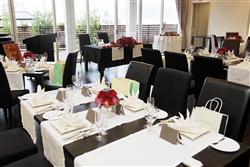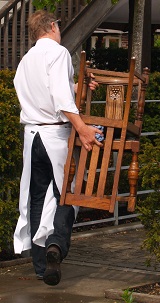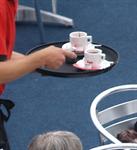 DISTANCE LEARNING COURSE HOSPITALITY AND TOURISM
DISTANCE LEARNING COURSE HOSPITALITY AND TOURISM
The proficiency award is made up of three modules and a work place project. The three modules each consist of 100 hours of study, so 300 hours in total. Then the work place project requires 200 hours to complete.
The Core Modules are -
You can find more information on the modules and the industry project below.
CORE MODULES
The three modules are
 Hotel management
Hotel management
There are 8 lessons in this course:
- Introduction: Scope and Nature of Hotel Management
- Role of the hotel Industry
- Classifying different Types of Hotels
- Accommodation Classification and Rating Schemes (eg. Star system,
- Scope of Industry
- Accommodation Products
- Role of the Accommodation Manager
- The Client
- Scale; Size of Establishment
- Economy of Scale
- Growth
- Why Hotels May Wish to Expand
- Risk Spreading
- Franchising
- Hotel Management Semantics
- Planning
- Objectives and Goals
- Types of Plans
- Policy; types, determination and sources
- Strategy
- Organisation of the Hotel Workplace
- Introduction
- Organisation of land, labour, capital
- Nature and Purpose of Organisation
- Mechanistic View of Organisation
- Human Relations View of Organisation
- Systems Approach to Organisation
- Organisation Structure in Hotels
- Informal Structure
- Hotel Organisation; Front Office, Maintenance, Housekeeping, etc.
- Organising the Housekeeping Department
- Organising the Maintenance Department
- Organising the Front Office
- The Provision of Accommodation
- Planning
- Staff Management in Hotels
- Areas of Management
- Food and Beverage Management
- Managing Front Office Operations
- Housekeeping Management
- Human Resources
- Supervision
- Marketing and Sales
- Accounting and Finance
- General Management
- Quality Leadership & Management
- Understanding Hospitality Law
- Charting relationships between people working together
- Line Relationships
- Line and Staff Relationships
- Function or Specialist Relationships
- Project Organisation Structure
- Communication and Coordination
- Staff Management
- The Personnel Function
- Objectives of Personnel Management
- Scope of Personnel Management
- Leadership
- Staff Motivation
- Authority
- Career Development
- Control Systems
- Sources and Storage of Information; internal and external
- Creating and Maintaining Information
- What to Measure
- Interpretation
- Selectivity
- Accountability and Controllability
- Creating Control Systems
- Maintenance of Control Systems
- Types of Control
- Production control
- Quality control
- Sales control
- Labour utilisation control
- Materials control
- Maintenance control
- Financial control
- Budgeting
- Setting Standards for Corrective Action
- Work Study
- Front Desk Management (Reception)
- Introduction
- Front Office Functions
- Reservation Systems
- Reservation Procedures
- Cancelation Procedure
- No Show procedure
- Registration of Guests
- Safe Deposits
- Control of Accounts
- Payment Methods
- Customer Service
- Customer Satisfaction
- Dealing with Grievances and Complaints
- Communication methods and Skills
- Questioning Skills
- Communication Barriers
- Developing Conversation
- Servicing Rooms and General Cleaning
- Scope and Nature of Housekeeping
- Service Equipment
- Hire or Purchase of Equipment
- Linen; purchase or hire
- Advantages and disadvantages of hire
- Choosing Fabrics
- Comparing Fabric Qualities
- Classification of Fabrics; natural and man made
- Fabric Flammability
- Linen Room Organisation
- Linen Room Staff
- Environmental Considerations in Hotel Management
- Workplace Health and Safety
- Advertising Sustainability
- Building and Facility Maintenance
- Expertise required
- Maintenance Scope and Nature
- Service Agreements; lifts, boilers, electrical, etc.
- Maintenance Records
- Daily, Periodic and Preventative Maintenance
- Frequent Maintenance Problems; Dampness, Faulty Roofs, gutters, downpipes, Wate pipes, Condensation
- Electrical Problems
- Safety
- Furniture Maintenance
- Maintaining Fittings
- Managing Maintenance
- Maintenance Checklists
- Equipment Cleaning
- Building Maintenance, general tasks
- Health and Safety Maintenance
- Repairs
- Toilets and Locker Rooms
- Activities Management
- Tour desk
- Gymnasium
- Events (eg. Weddings, balls etc)
- In house Services, Recreation Facilities,
- Guest Information Services, Swimming Pools, Spa & Sauna Facilities
- Activities Management, Tourism.
- Food Service
- Types of Food Service (eg. Room Service, Bar, Restaurant, Coffee Shop etc)
- Kitchen Design & Equipment
- Service Facilities
- Food Service Management
- Food Purchasing
- Dealing with Complaints.
Each lesson culminates in an assignment which is submitted to the school, marked by the school's tutors and returned to you with any relevant suggestions, comments, and if necessary, extra reading.
 Food and Beverage Management
Food and Beverage Management
- This subject has 9 lessons as follows:
1. Human Nutrition - This covers all the major food groups and their importance in a nutritional diet. Also including factors in nutrition from compatibility and range of ingredients through to healthy cooking and eating methods.
2. Cooking - Includes various cooking methods for a variety of different foods, covering both palatability and digestibility through to the nutritional value in processing foods.
3. Kitchen & Food Management - Learn to maximise efficiency and service through proper management of kitchen facilities, including the handling of food storage and preparation, hygiene and ethics.
4. Planning A Menu - Covering menu planning for the needs of special groups in different situations, including children; adolescents; elderly people; expectant and nursing mothers; immigrants; vegetarians and other health related diets.
5. Alcoholic Beverages - Learn how to provide adequate variety and product knowledge in order to manage the provisions of alcoholic beverages appropriately for different situations.
6. Tea, Coffee and Non-Alcoholic Beverages - This lesson provides an understanding of non-alcoholic beverages available in the catering industry and how they should be made and served.
7. Scope & Nature Of Catering Services - Learn to understand the differences in appropriate management and catering for a variety of situations from pubs to a-la-carte.
8. Personnel Management -(waiting skills, staffing a restaurant, kitchen etc) This lesson covers the management of people in the food and restaurant industry, including training programs, job specifications, recruitment etc.
9. Management Of Catering Services - By consolidating the skills developed throughout this course you are given a comprehensive understanding of marketing through to food purchasing in order to effectively manage in the food and beverage industry.
Ecotour Management
There are 9 lessons as follows:
- Nature and Scope of Ecotourism -
- Definition of ecotourism
- Negative ecotourism
- Principles of ecotourism
- Management Issues -
- Recreation and the environment
- recreational impacts on the environment
- ethical and legal concerns
- code of practice for ecotourism operators
- incorporating ecotourism principles into activities
- interpretation
- visitor guidelines
- planning for minimal impact
- quality control
- Industry Destinations -
- The ecotourism market
- what do ecotourists want?
- trends in international tourism
- understanding the needs of the consumer
- consumer expectations
- The Tour Desk/Office -
- Office procedures
- providing information
- employment prospects in ecotourism
- bookings
- business letters
- telephone manner
- Accommodation Facilities -
- Types of accommodation facilities
- layout of facilities
- Catering Facilities -
- Introduction to catering
- accepted practice for service facilities
- storing and preserving food
- Legal Considerations -
- National Parks
- land use/planning restrictions
- code of practice
- Safety-
- The safety strategy
- hazards
- first aid
- Planning an Ecotourism Activity -
A special project where the student plans out an ecotourism activity including:
- budget
- accommodation
- licenses
- meals
- destination
INDUSTRY PROJECT OR WORK EXPERIENCE
This is the final requirement that you must satisfy before receiving your award.
There are different options available to you to satisfy this requirement; ranging from undertaking relevant work experience, to doing industry oriented coursework modules such as Research Project I & II or Workshop I & II.
Tourism is an industry that offers lots of opportunities. From time to time you may read that tourism is down or up; and these media reports can create an impression that it is an unstable industry. This is not true though; and if you properly understand tourism; you will also understand that it is on a very solid industry.
Tourism enterprises employ both full time people as business owners, managers and permanent staff; as well as large numbers of temporary and part time staff. The temporary and part time positions do fluctuate; according to the highs and lows in the industry, but on the whole, the permanently positions are just as stable as positions in any other industry.
The skills and expertise needed to work in tourism, varies according to the type of job you are in.
These jobs can be as varied as:
- Tour Company Owners or Staff
- Booking Agents
- Tour Guides or Leaders
- Theme Park Managers
- Guesthouse operator
- Activities Officers
- Event Managers
- Entertainers
- Transport Services Staff -Drivers (bus, limo, etc), pilots (plane, helicopter), captains (cruise ship, sightseeing boat, dive boat, ferries, etc)
Some people work full time in this industry, but many others work part time to supplement other work.
Remuneration can be excellent if you own your own business or manage a larger tourism venture. Getting ahead is dependant upon not only what you know, but also building networks and getting experience. This course aims to set you on a good path to develop all these things.
WHAT NEXT?
Register to Study - Go to “It’s Easy to Enrol” box at the top of the page and you can enrol now.
or
Get Advice – Email us at info@acsedu.co.uk OR
Use our FREE COUNSELLING SERVICE to contact a tutor
CLICK TO CONTACT US